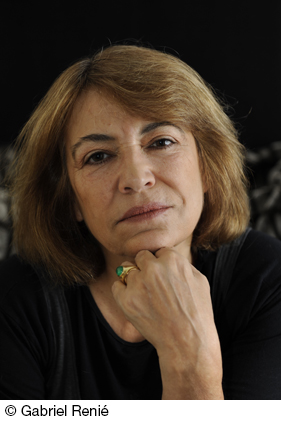October 2017, Year IX, no. 10
Marcela Serrano
Write, fight, love. Between Chile and Rome
“The global phenomenon of indifference is growing amongst the young and more and more people abstain from voting during elections”.
Telos: A woman who has chosen to talk about women to everyone: “I am a feminist. But I’ve never thought about writing only for women”. What does it mean to be a feminist in today’s world? and which causes do we still have to fight for in a society that considers itself equalitarian?
Marcela Serrano: It’s not a question of choice. All I want to do is write stories, and the only ones that sprung to mind have female protagonists; I knew these stories very well, I had them at my fingertips. Only afterwards I did realise that it wasn’t a random choice, that I was tired of forever reading only about men. But I don’t believe literature has a gender. There’ve always been the “Western Canon”, but there’s never been any talk of gender; no-one would ever dream of saying that the classics were male, they just WERE, full stop. But as soon as we women arrived on the scene we were immediately classified as a sub-genre. Because this is what happens when someone invents a category labelled ‘female literature’. The conceptual ambiguities that male chauvinism can insinuate into a conversation means that being a feminist in today’s world is more important than ever before. We’ve come so far that some people have begun to think that we’ve achieved our goal. Wrong! There’s still so much to do, no doubt about it, there’s still ever so much to do. Of course we’ll continue to lobby for gender equality legislation and we’ll take to the streets whenever we have to. But I believe that today’s goal should be our ‘private life’. If we’re not equal at home, then everything else is useless. Bringing up our children. Taking care of our elders. Violence. Cooking. Laundry... shall I go on? We will not have won until these tasks are performed by both men and women.
You’ve never been politically active, but you’ve always carefully scrutinised both your native land, Chile, and the whole Latin-American continent. What is the political situation in Latin America and what, in your opinion, does the future hold?
These are sad times for my native continent. Corruption and violence are triggering a slow but sure decline. Up to 10 years ago we were proud of our governments; we thought we were on the right road to brotherhood and equality. Instead corruption kills everything. And the conservative and neoliberal right parties don’t help. They come to power and gradually take over one country after another; they introduce unregulated capitalism and try to trim down the role of the State as much as possible. The poor have to look after themselves, these governments focus on the rich. In addition, since Latin America is not an island unto itself, we also suffer from the fact that politics (as in the rest of the world) is abandoning its role as a public service and turning into something mediocre and compromised.
Or we have to stand by and witness irrational fanaticisms, for example in Venezuela. The global phenomenon of indifference is growing amongst the young, and more and more people abstain from voting during elections. Having Trump hanging over our heads doesn’t help at all. After the presidential elections in the United States, everything is possible. I feel that ‘good people’ are withdrawing from politics because they’re tired of what it’s turned into, but by doing so they’ve left the field open for schemers and opportunists. Sometimes I wonder... what would happen if drugs were produced in Europe? I have placed all my hopes in the new generations which exist, at least in Chile; they are organised and in good health. I grieve for all those places where there is no new generation and where people are denied even this kind of consolation.
Is there a female leader in international politics that could be a source of inspiration for one of your books?
No, no-one inspires me. There are so few women and none seem sufficiently dramatic, sad or heroic.
Some time ago you lived in Rome for a few years. What’s good or bad about life in Italy?
I’ve just got back from Rome. I rented an apartment in Piazza Farnese for two weeks and was very happy! I walked around the city, dawdled along buying cheese in a shop or fruit at the Campo dei Fiori market. I have some wonderful memories of Rome and Italy. Each time I go back I make a sort of pilgrimage to the places I’ve been many years ago. Once, while I was looking at a building where I’d stayed, the main door opened and I tried to go in. I got to the door of my old apartment on the top floor. Courage failed me and I didn’t ring the doorbell: what could I have said to the people living there? It was on the Janiculum Hill. I’ve often said: if you’ve got to live the tragic life of an exile – because being an exile is tragic – the best place to be an exile is in Italy.
The solidarity the Italians demonstrated to the Chileans after the coup d’état was admirable, so many people were generous! We’ll never be able to thank them enough. Italy is a country that exudes warmth. And we needed that warmth. I have so many memories: female friends who gave me clothes because my poverty saddened them; the doctors who treated me free of charge regardless of the fact that I wasn’t entitled to medical care; all those people who found us jobs and who invited us to sumptuous dinners, real banquets, because they had feared we didn’t have much to eat; all those who helped us with the language... and so much more. There’s a part of me that will always be Roman.
Marco Sonsini
Editorial
‘It doesn’t hurt to try’. Our interview with Marcela Serrano, a Latin American literary legend, is yet more proof of the fact that we can trust proverbs. Usual method: an email with our request, an explanation about who we are and what we do, and then... wait for an answer. Some ignore us, others want to know more, still others say no.
Serrano’s answer was simple and direct, the kind that only the great know how to give: a simple yes. For which we are very grateful. The interview touches on important issues: female literature (what rubbish!); feminism (much has been done, but we mustn’t lower our guard), political alienation (a common problem), and Serrano’s eternal love for Italy and Rome (what joy!).
When she writes Serrano doesn’t have a fixed goal or a premeditated intent in mind. Her only objective is to write; if her readers identify with the stories she writes, inspired by her imagination, well then, that’s a great achievement. And she’s happy. Deep down, we feel she’s convinced that even in everyday life men are not interested in what really happens to women. But the last frontier of feminism is exactly that: everyday life. Serrano’s is a joyful feminism, firmly anchored to a genuine ideology, but without loosing sight of reality. She says that the fight will only be over when the role of men and women is interchangeable and both genders assume the task of ‘Bring up our children. Taking care of our elders. Violence. Cooking. Laundry... shall I go on’…
Instead there’s still a lot to do to revive people’s political commitment, or even just to get them to vote. Serrano’s description of the crisis between individuals and institutions - quite apart from the politics involved - is similar to what is happening in Italy. Elections are not far off and the non-voting party is a silent majority. Especially among the young who are increasingly disenchanted with politics. Fewer and fewer youngsters participate and join in the initiatives organised by political movements, or are actively involved with a political party, or are clear in their minds about the dynamics of those who govern us.
The political disenchantment of young Chileans is particularly disturbing, even if Serrano says that there are signs of a revival. There was a period in the history of the Italian Republic when the country was almost a mirror-image of Chile. Enrico Berlinguer’s Historic Compromise was in some ways inspired by the events in Chile. After the coup d’état the two countries forged a bond that still endures thanks to the role played not only by our political parties and democratic institutions in physically saving and welcoming hundreds of exiles fleeing from the dictatorship, but also by the Italians.
The memories Serrano shares with us are very moving. Her last words in the interview were: ‘There’s a part of me that will always be Roman’. Even now, her words inspire valuable considerations, if not lessons - words relating to their political struggle, analysis, passion and hope.
However, there’s one last thing to mention about the interview: we discovered that she is not inspired by any, I repeat, any contemporary female politician, anywhere in the world. All a little ordinary and lacking in courage. We’ve got to get a move on!
Mariella Palazzolo

Marcela Serrano is an award-winning Chilean writer. Her mother Elisa Pérez Walker was a novelist, and her father Horacio Serrano was an essayist. She is the fourth of five sisters. First studies with Northamerican nuns, later she studied Fine Arts at the Pontifical Catholic University of Chile, choosing engraving as speciality. Involved in politics since entering university, Marcela took part to left movements, causing a bit of scandal in her conservative world.
- 1973: Chilean coup d’etat. Marcela chose Rome as the country for asylum.
She has lived all over he world: Paris, together with two of her sisters, for a year as a student at the Maison des Amériques; Rome, four years as an exile, México, six years, and Argentina, another six, as the wife of the Chilean ambassador.
- 1991: her first novel ‘Nosotras que nos queremos tanto’, was published. The latest, ‘La Novena’ in 2016, was her tenth. She has also published short stories and stories for children.
The most important place in her life has been a big farm (hacienda) in the south of Chile where she learned to read, to write, to draw and to love silence. There she was surronded by her two horses, dogs and cats. Everything came to an end when the “Reforma Agraria” (Chilean Land Reform), during Allende´s government, took it away from her family. She was 21.
Since two years or so she has returned to her fascination with shapes and images, the ones that led her to study Fine Arts. Now she does collages and had her first exhibition ‘Cuentos’ in Chile in July 2017.
Marco Sonsini







SocialTelos